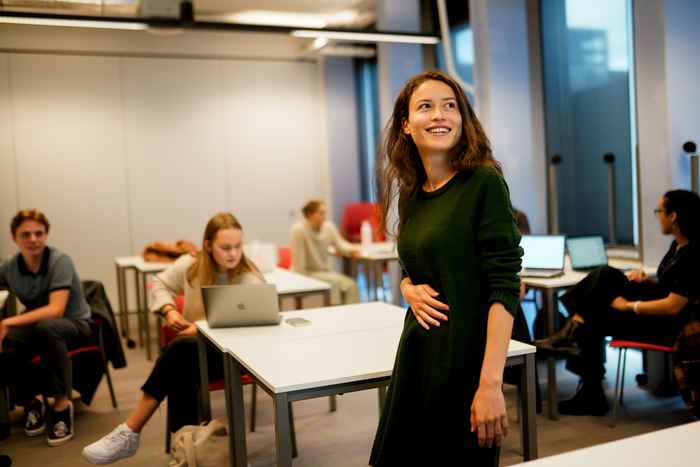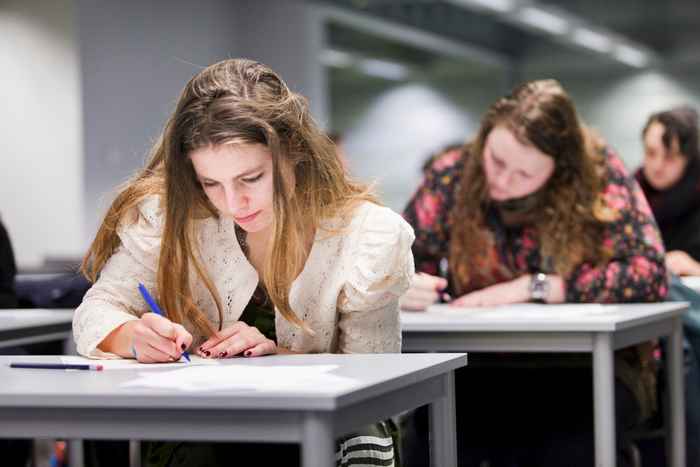Programme Structure
Semesters at PPLE College
The academic year consists of two semesters and runs from the first Monday in September until the 31 August. The two semesters of each academic year are split into three blocks. Each block has its own examination period. Six examination periods may seem like a lot at first. In practice, however, it means the study load is evenly spread, and there is plenty of opportunity to turn what you have learned into grades that count.
Gathering credit points
PPLE’s three-year programme consists of 180 study credit points, so-called European Credits (ECs). Most courses within the PPLE programme are allocated 6 of these ECs or study credit points. These add up to a total of 60 ECs per academic year. Students gather their credit points by completing:
- 8 interdisciplinary courses that make up the core curriculum; four integrative seminars and four methodological courses. These are compulsory for all PPLE students (102 ECs)
- courses in the student's chosen specialisation and the Bachelor’s thesis (66 ECs)
- additional courses based on personal interests, so-called electives (12 ECs)
Going abroad for your education can be an exciting way to enrich your university experience. PPLE students can include a study abroad experience in their programme. This can be either a full semester exchange or attending a summer school abroad. However, given the clear structure of the PPLE degree, there is limited space in the curriculum. It requires planning and flexibility. You will likely need more time to complete your PPLE Bachelor.
-
What you don’t learn in school
You learn a lot in school – especially when you study PPLE. And yet, topics that determine your quality of life are hardly ever addressed in your studies. PPLE wants to change that. Hence, the course programme includes tailor-made courses that run throughout the first and second years of study. They are meant to help grow emotional intelligence and build real-world confidence and are not for any credit. They are simply there for you to get to know yourself, others and the world around you.
-
Teaching methods at PPLE

PPLE brings together a range of learning and study methods. The programme updates established educational practices with the latest advancements in educational methods and approaches. Students get challenged through these various teaching methods that complement each other:
-
Lectures are general introductions to the course matters and comprise around 40 percent of all contact hours. PPLE lecturers are academic experts in their field, often supplemented by guest lecturers on the latest research topics in their area of expertise.
-
Tutorials are in-depth discussions on lectures and the course literature, organised in small groups of no more than 17 students. The main focus is to get actively involved with the material, often through practical exercises or activities.
-
Practical assignments will be assigned during interdisciplinary modules. These centre on problem-based learning and ask students to do assignments like writing papers and giving presentations in small groups.
-
Assessments are conducted in the form of written examinations, papers, presentations or a combination of all three.
-
-
Time off
The highly structured character of the Dutch academic system makes for a clear separation between periods of coursework and time off. Like every other student in the Netherlands, PPLE College students are off for eight weeks during summer, in July and August. Other off-days include Christmas, New Year's and a few days of Dutch national holidays in May.
Curious about the courses included in the PPLE programme?
Dutch university culture and grading at PPLE
For many Dutch students, university is a way to enrich their life and the start of their journey towards independence. That is why Dutch academic culture is all about offering an enriching learning experience. It is not just about getting high grades.
The Dutch academic grading system is based on a scale of 1 to 10. A 5.5 is a pass and an 8 is considered highly excellent. For many international students, this system may be confusing at first. It is good to realise that grades like 9 and 10 are rarely awarded. In reality, the most commonly awarded grades are 6 and 7; both indicators of good performance.

The 1 to 10 grading system was introduced in the late 19th century. Back then, the 10 was used as a way to refer to godlike perfection. Basically, as something unattainable for mere humans. And so the 10 was rarely if ever awarded. 9 was considered a slightly more attainable grade.
To this day, the high standard set for a perfect 10 continues to make it a rare and highly-coveted grade in the Netherlands. In recent times, the increase in the multiple-choice and yes-no type of exam questions has made 10 or 9 slightly more attainable grades for very ambitious students. However, in oral examinations, or open-question testing, such as essays, presentations or dissertations, these grades are still very rarely given.
